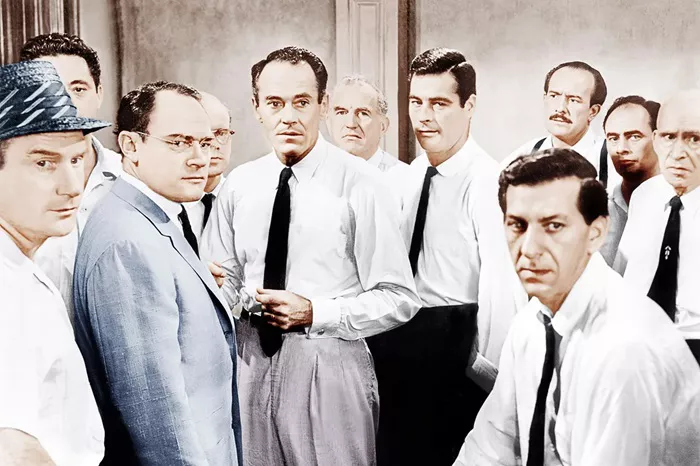Few works in the realm of theater and film have achieved the enduring acclaim and cultural significance of “Twelve Angry Men.” Regarded as a quintessential masterpiece, this gripping drama continues to captivate audiences across generations, sparking discussions on justice, prejudice, and human nature. But what precisely accounts for its unwavering fame and resonance? Let us delve into the multifaceted reasons behind the enduring popularity of “Twelve Angry Men.”
A Compelling Exploration of Justice and Morality
At the heart of “Twelve Angry Men” lies a profound exploration of justice and morality. The play confronts viewers with the complexities of the legal system, raising pertinent questions about the nature of truth and the responsibility of jurors. Each character embodies different perspectives and biases, contributing to a rich tapestry of moral dilemmas. Through its meticulous examination of evidence and deliberations, the play challenges audiences to reflect on their own beliefs and values, compelling them to confront uncomfortable truths about the justice system and society at large.
Intriguing Character Dynamics and Psychological Depth
Central to the enduring allure of “Twelve Angry Men” are its meticulously crafted characters and their intricate dynamics. From Juror 8, the principled protagonist who initiates the dissenting vote, to Juror 3, whose personal biases cloud his judgment, each character is imbued with distinct personality traits and motivations. As tensions escalate within the jury room, viewers are drawn into a psychological labyrinth, witnessing the unraveling of hidden prejudices and emotional turmoil. This rich portrayal of human behavior and interaction serves as a compelling mirror to our own complexities, ensuring the play’s relevance across different eras and societal contexts.
Masterful Execution of Dramatic Tension
One cannot discuss the fame of “Twelve Angry Men” without acknowledging its masterful execution of dramatic tension. Set almost entirely within the confines of a deliberation room, the play unfolds in real-time, heightening the sense of immediacy and suspense. As the jurors grapple with the weighty task before them, the intensity steadily mounts, keeping audiences on the edge of their seats until the climactic resolution. The strategic pacing and skillful dialogue ensure that every moment brims with significance, making for a riveting theatrical experience that leaves a lasting impact on viewers.
See Also: What is the story of “A Beautiful Mind”?
Timeless Relevance and Social Commentary
Despite being penned over six decades ago, “Twelve Angry Men” remains remarkably relevant in its social commentary and thematic resonance. The issues of prejudice, justice, and the power dynamics inherent in group decision-making are as pertinent today as they were in the 1950s. The play’s exploration of systemic biases and the fragility of truth continues to resonate with audiences grappling with contemporary societal challenges. By shining a spotlight on these enduring themes, “Twelve Angry Men” transcends its temporal setting, serving as a poignant reminder of the perennial struggle for fairness and integrity in human affairs.
Iconic Adaptations and Cultural Legacy
The enduring fame of “Twelve Angry Men” is further cemented by its numerous adaptations across various mediums. Sidney Lumet’s acclaimed 1957 film adaptation, featuring a stellar ensemble cast led by Henry Fonda, brought the play to a global audience and garnered widespread critical acclaim. Subsequent adaptations in theater, television, and radio have further solidified the play’s status as a cultural touchstone, ensuring its enduring legacy for generations to come. Each reinterpretation adds layers of nuance to Reginald Rose’s original vision, demonstrating the timeless appeal and adaptability of its core themes and narrative.
Educational Value and Theatrical Pedagogy
Beyond its entertainment value, “Twelve Angry Men” holds significant educational merit, particularly in the realm of theatrical pedagogy. The play serves as a compelling case study for students of drama, offering insights into character development, dialogue construction, and thematic exploration. Its structured format and rich dramatic material make it an ideal text for analysis and performance in educational settings, fostering critical thinking skills and empathetic engagement with complex social issues. By dissecting the nuances of the jury deliberations, students gain a deeper understanding of human psychology and the intricacies of interpersonal dynamics, enriching their appreciation for the art of theater and storytelling.
Cultural Impact and Enduring Resonance
In the pantheon of dramatic literature, “Twelve Angry Men” occupies a hallowed place, its influence extending far beyond the confines of the stage or screen. Its themes of justice, prejudice, and moral integrity have permeated popular culture, inspiring countless adaptations, parodies, and references in literature, film, and television. Moreover, its legacy as a catalyst for meaningful dialogue on social issues continues to reverberate in classrooms, courtrooms, and beyond. As long as questions of justice and human nature endure, so too will the timeless fame and relevance of “Twelve Angry Men.”
In Conclusion
The fame of “Twelve Angry Men” endures as a testament to its timeless themes, masterful craftsmanship, and enduring relevance. Through its exploration of justice, morality, and the complexities of human behavior, the play continues to captivate audiences and spark meaningful discourse across generations. As society evolves and confronts new challenges, the enduring legacy of “Twelve Angry Men” serves as a beacon of insight and inspiration, reminding us of the enduring power of storytelling to provoke thought, elicit empathy, and illuminate the human condition.























